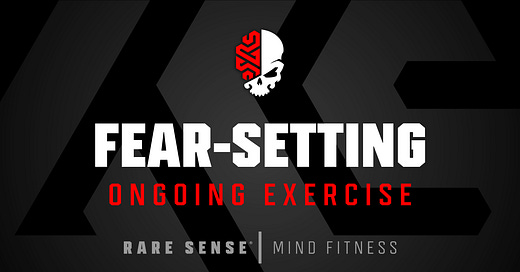This exercise is called “fear-setting,” as detailed in this TED Talk by Tim Ferriss. He derives the practice from the Stoic practice of premeditatio malorum, which means “the premeditation of evils.” Simply put, it’s envisioning the worst-case scenario so you are best prepared if it transpires.
The problem is that for many who tend towards anxiety (like me), catastrophizing is often the state of our default mode network and is destructive. Thinking this way doesn’t make us feel better. Quite the opposite, it can paralyze us. And we do it all the time.
However, most of the horrific outcomes we envision never happen. But since we’ve patterned ourselves to always look ahead with trepidation, we rarely notice this reality. Fear-setting is a way to analyze and counteract that tendency objectively.
My version of the exercise is a version of Ferriss’ and involves creating four columns on a sheet of paper or in a journal as follows:
DEFINE. Define your fears. What is it you are worried might happen? List out as many as possible in detail.
PREVENT. For each, establish a mitigation measure to prevent or decrease the likelihood of that outcome.
REPAIR. If that didn’t work, what could you do to repair the damage caused by the fear coming true?
ANALYZE. When the scenario in question came to pass, what actually happened?
This fourth component is my addition and crucial. I’m willing to bet most calamities you have anticipated in the past didn’t occur. That column allows you to see that fact for yourself. Maybe it’s time to stop assuming the worst.
DISCLAIMER: RARE SENSE® content is not medical advice. Nor does it represent the official position or opinions of any other organization or person. If you require diagnosis or treatment for a mental or physical issue or illness, please seek it from a licensed professional.






Heard an interesting discussion on anxiety on 1A, NPR a few weeks ago. Basically, it's part of what we are as humans. We just have to learn how to translate the emotion in healthy ways. Good to hear it's normal cause I sure haven't gotten rid of it, just learned how to control it.